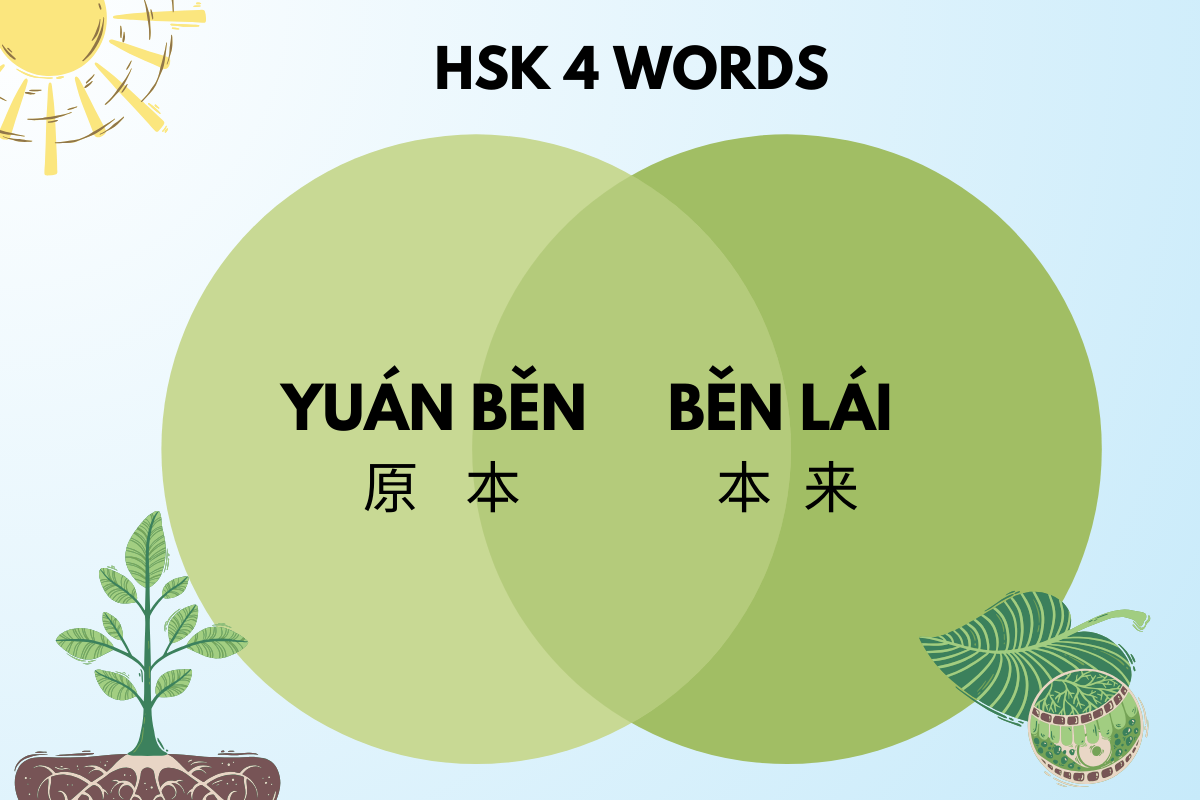HSK 4 Words: 原本 (yuán běn) VS 本来 (běn lái)
The Chinese language is a complex and intricate system, rich in history and cultural depth. Two terms that are often used interchangeably in the language are 原本 (yuán běn) and 本来 (běn lái). While these two HSK terms may seem similar, they actually carry distinct meanings that are important to understand. In this article, we will delve into the nuances of these two terms and explore their differences through a detailed analysis.

原本 (yuán běn) typically implies a prior or original state or condition before any changes or alterations occurred. It can be used to describe something that existed previously or was in its original form.
Examples:
- The original plan was to travel, but due to time issues we changed our plans.
原本的计划是去旅行,但因为时间问题我们改变了计划。
yuán běn de jì huà shì qù lǚ xíng , dàn yīn wèi shí jiān wèn tí wǒ men gǎi biàn le jì huà 。 - This book was originally white, but it got dirty.
这本书原本是白色的,但被弄脏了。
zhe běn shū yuán běn shì bái sè de , dàn bèi nòng zāng le 。 - He had hoped to remain a full-time police officer.
他原本希望继续当全职警察。
tā yuán běn xī wàng jì xù dāng quán zhí jǐng chá 。
本来 (běn lái) also implies a previous or original state or condition, but it can also suggest a natural or inherent condition or quality. It can be used to describe something that existed previously or was in its original form, but it also can suggest the inherent nature or characteristics of something.
Examples:
- He was already smart enough not to have to go to tuition classes.
他本来就很聪明,不用再去上补习班了。
tā běn lái jiù hěn cōng míng , bù yòng zài qù shàng bǔ shí bān le 。 - This building was originally intended to be an office building, but it has now been converted into a residential building.
这栋楼本来是用来做办公楼的,但现在被改成了住宅楼。
zhe dòng lóu běn lái shì yòng lái zuò bàn gōng lóu de , dàn xiàn zài bèi gǎi chéng le zhù zhá lóu 。 - This accident could have been prevented.
这次事故本来是可以防止的。
zhè cì shì gù běn lái shì kě yǐ fáng zhǐ de 。
In summary, 原本 (yuán běn) and 本来 (běn lái) are two distinct words in Chinese. 原本 (yuán běn) implies a prior or original state or condition before any changes or alterations occurred, while 本来 (běn lái) can also suggest a natural or inherent condition or quality.
Quiz: Please consider whether to use 原本 (yuán běn) and 本来 (běn lái) in the following sentences.
- 他______会尽最大努力取帮助她。
tā ______ huì jìn zuì dà nǔ lì qǔ bāng zhù tā 。 - 投票日期______定在明天。
tóu piào rì qī ______ dìng zài míng tiān 。 - 他______可以带上一把备用钥匙的。
tā ______ kě yǐ dài shàng yī bǎ bèi yòng yào shi de 。
Answers:
- 本来 (běn lái)
- 原本 (yuán běn)
- 原本 (yuán běn)